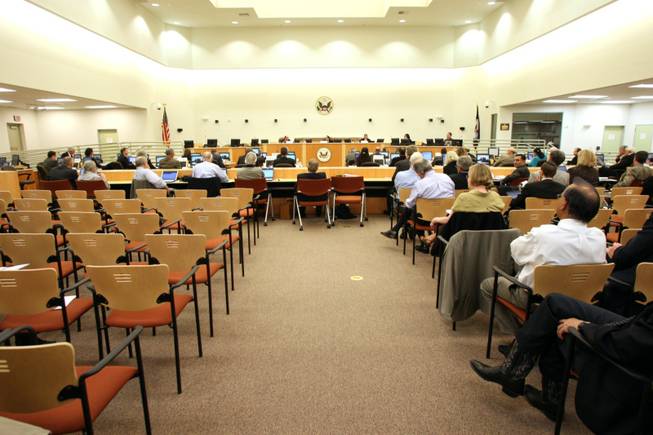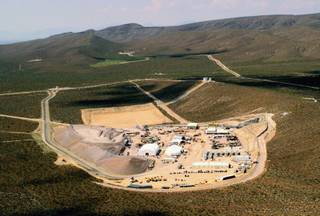
Hearings this week in Las Vegas on the federal government’s plans to store highly radioactive waste at Yucca Mountain drew little public attendance. But Nevada officials and several other groups showed up to raise 320 objections to the plan.
Saturday, April 4, 2009 | 2 a.m.
Sun Topics
Sun Archives
- In D.C., a sea change on dump plan (3-19-2009)
- Dump plan's key supporters not ready to concede (3-4-2009)
- Yucca funding: Another $100 million cut (2-23-2009)
Sun Blogs
Some years ago, an earthquake interrupted a meeting of the Nuclear Waste Technical Review Board — precisely at the moment participants were discussing how a future earthquake could affect a nuclear repository at Yucca Mountain.
After the quake passed, discussion casually resumed.
It was as if that day’s earthquake and Yucca Mountain’s future “were in parallel universes,” recalls Abby Johnson, nuclear waste adviser to Eureka County.
Johnson said the same surreal feeling surrounded Yucca Mountain licensing hearings this week in Las Vegas. The proceedings rolled on as if the administration of President Barack Obama hadn’t all but killed funding for the project, as if Congress and the nuclear industry weren’t hashing out “Plan B” for nuclear waste storage, as if the secretary of energy hadn’t said he had no intention of seeing Yucca Mountain built.
The hearings in a nondescript building east of McCarran International Airport were the latest stops in the federal government’s meandering effort to store 70,000 tons of nuclear waste inside the mountain 90 miles northwest of Las Vegas.
Taking in the expansive modern hall specifically constructed for hearings on the project, Johnson appeared in awe that the day had finally arrived. After so many lawsuits, hearings, debates and disagreements between Nevada and the Energy Department, the Nuclear Regulatory Commission — the federal agency that is the impartial decider of the project’s fate — would finally hear testimony about who could challenge the government’s license application, and what could be alleged.
Each group seeking to raise a concern about the license application sat at a table facing the dais, briefcases at their sides filled with reams of documents supporting their arguments.
The three days of hearings were a kind of pretrial, but the stakes were high. Every contention thrown out at this stage would be one less opportunity to make a case later against the repository or, in the case of the nuclear energy industry — in favor of it. One less chance to examine the controversial science on the feasibility of safely storing nuclear material for thousands of years.
The biggest of the alleged holes in the Energy Department’s Yucca license application, according to Nevada, is that the project’s safety plans rely on installing 11,000 titanium drip shields 100 years from now, after the waste has been placed inside the mountain. Installing the drip shields would require technology that hasn’t been invented, the state says, and the application does not consider the effects if the drip shields cannot be installed.
Nevada, several counties and others would like to bring forward hundreds of other concerns about the Energy Department’s science. They say it fails to take into account expected changes in precipitation tied to global warming, fails to use the right calculations for volcanic activity, fails to properly anticipate how fast waste canisters will corrode and fails to substantiate that the department could block air traffic over the mountain to avoid air crashes. These groups also argue that environmental impact statements didn’t sufficiently consider the effect of transporting waste to the site.
In all, there were 320 contentions from 14 groups.
The Energy Department says none of these critiques should be heard because they all violate technical requirements of the regulations.
Below an eagle seal, the first of three panels of three judges each took their seats Tuesday morning to hash out the arguments. Ten years ago, the Nuclear Regulatory Commission created an entire section of federal code, Part 63, specific to the Yucca Mountain process. Many details of the code had never been interpreted.
Chairman Paul Ryerson began by asking for any procedural questions.
There was one: Lead Nevada attorney Martin Malsch wondered if, given that the Obama administration has indicated it does not wish to see the Yucca Mountain project to completion, the Energy Department attorneys were still representing the department’s position.
“It’s the only answer we have and we are making that assumption,” Ryerson said, nodding toward the Energy Department attorneys.
The reversal of federal policy on Yucca has been sudden and, from Washington’s perspective, decisive.
Even the Yucca project’s most ardent supporters acknowledge it is not likely to be built.
Finding another solution has become the priority in Washington. So far, that includes setting up a blue-ribbon panel to explore alternatives for disposing of nuclear waste.
In the meantime, at least, the licensing process continues.
Energy Department spokeswoman Stephanie Mueller said the department is still evaluating the legal and financial implications of revoking the license application.
Energy Secretary Steven Chu told a Senate committee that continuing the licensing process with the commission could help inform future nuclear waste policy.
All of that would suggest the department is fighting a fight it doesn’t really believe in.
If that is the case, participants in the Las Vegas hearings couldn’t tell. Yucca Mountain foes and supporters said they were taking the licensing at face value, as a process that could, some day, net a repository. They noted that if the Energy Department doesn’t pull the license application, the process will likely extend beyond the four years allotted to it, and by then a new administration could restore its design and construction funding.
“I don’t think this is going through the motions at all,” said Bruce Breslow, who three months ago became executive director of the Nevada agency charged with fighting the repository plan. “There’s massive money behind this and the Department of Energy is saying everyone’s contentions against the project should be thrown out. They won’t give an inch.”
Throughout the three days of hearings, Energy Department attorneys, led by Donald Silverman and Alex Polonsky, presented a spirited defense of their positions against a barrage of pointed questions from commission judges. Many times various judges indicated they may be inclined to side with Nevada and others to let contentions go forward, to be decided later in the process.
Why, the judges wondered aloud again and again, had the Energy Department contested all 229 contentions that Nevada submitted? It seemed disingenuous, they repeatedly said.
During the second day of hearings, some judges admonished not only the Energy Department but the Nuclear Regulatory Commission’s own advisory staff, who had agreed with the department in all but 19 cases that Nevada’s contentions should be tossed.
“Should ... we conclude that a significant number of the Nevada contentions are clearly admissible ... for me at least both DOE and the NRC staff will have lost credibility,” Judge Alan Rosenthal said in a prepared statement Wednesday morning. “The staff would to its detriment create the impression that it is not a disinterested participant in the licensing process but, rather, a spear carrier for DOE. Once such an impression has been garnered, there remains little reason to credit anything the staff might have to offer.”
The agency’s attorneys and the commission staff denied they were acting in bad faith.
“We did not proceed on the predetermined basis to challenge contentions nor to throw everything against the wall to see what sticks,” Silverman, an agency attorney, said Wednesday afternoon. “We take our ethical obligations seriously.”
Commission staff members also defended themselves.
Judge Michael Farrar said Tuesday it appeared as though staff members were treating protests of the Yucca Mountain case with a higher bar to entry than protests filed against past commission cases.
“We did not arbitrarily raise the bar,” said Mitzi Young, representing the staff. It’s not fair to compare the Yucca repository case to other nuclear licensing because the case is unprecedented, she said.
Final decisions won’t be made until May, but Yucca project supporters and foes agreed the sometimes snappy remarks from judges are signs they’re willing to act independently.
Paul Seidler, a spokesman for the Nuclear Energy Institute, an industry group, said, “This is a legitimate process. It’s designed to be above politics.”
Outside the hearing room, the lines have become blurred between Yucca supporters and detractors since the Energy Department leadership reversed course on the issue.
But inside the hearing room, there was no such confusion.
Seidler took a front-row seat for the drama.
“They’re all playing a role in this process,” he said.


Join the Discussion:
Check this out for a full explanation of our conversion to the LiveFyre commenting system and instructions on how to sign up for an account.
Full comments policy